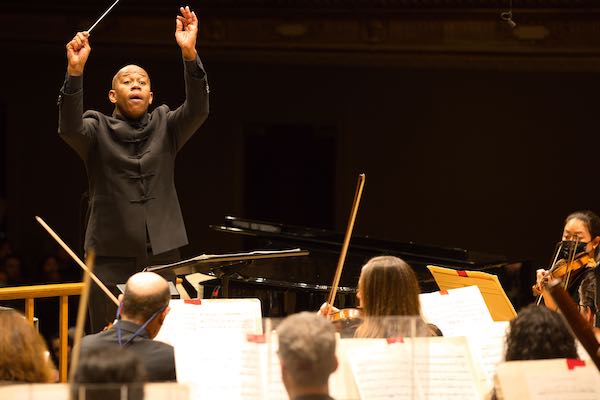Lackluster conducting undermines BSO festival spotlighting black composers

André Raphel conducted the Boston Symphony Orchestra in music of Still, Caine and Coleridge-Taylor. Photo: Hilary Scott
The Boston Symphony Orchestra doesn’t do festivals often. So “Voices of Loss, Reckoning, and Hope,” which kicked off last Friday and runs through March 18, is a welcome development.
With its focus on music by underrepresented groups (particularly women and composers of color), the series is a timely one, promising several BSO premieres as well as the potential for musical, political, and social resonance one doesn’t always encounter on the corner of Mass. Ave. and Huntington.
To be sure, this isn’t entirely new ground the orchestra’s breaking. Since 2019, the BSO has offered a March date (sometimes a one-off concert, sometimes a subscription concert series) that spotlights marginalized fare. This year, the concept is simply expanded and incorporates programs lost to the pandemic.
Unfortunately, the new tack still doesn’t solve the old problem of isolating the music of primarily black composers from the larger canon. One still longs for the day when William Levi Dawson and George Walker will regularly share the stage with Beethoven, Debussy, and Prokofiev.
But this is a start, as the festival’s opening lineup demonstrated. Led by André Raphel, it consisted of a trio of BSO premieres by Samuel Coleridge-Taylor, William Grant Still, and Uri Caine.
Most compelling among them was Still’s Symphony No. 1 (“Afro-American”). Written at the height of the Harlem Renaissance, its four movements are labeled “Longing,” “Sorrow,” “Humor,” and “Sincerity,” and bear epigraphs from the poet Paul Laurence Dunbar. In each, Still’s writing is unfailingly melodic and scored with the deft hand of a composer with an exacting command of sonority.
Listening to Raphel lead the BSO in Still’s mellifluous essay on Sunday afternoon at Symphony Hall, one could easily appreciate the technical mastery the ensemble brought to this music. Everything spoke fluently, its stylistic shifts unfolded naturally, and the Symphony’s lyricism emerged richly intact.
Small details—from the Moderato’s play of colors to the Adagio’s solo dialogues and bent notes, as well as the neatly-balanced, Blues-inflected refrains in the finale—came out winningly. Given this, one could excuse the interpretation’s periodic moments of edginess, its hampered dynamic range (pianos rarely seemed to fall below mezzo-piano), and occasionally blinding tone.
Many of these issues also emerged in the Coleridge-Taylor. The origins of his Petite Suite de Concert are obscure, but its four movements are unfailingly fresh and tuneful.
One struggled to appreciate those qualities consistently on Sunday. True, the BSO’s reading didn’t want for energy, either in the outer movements or, a bit surprisingly, in the reflective second. But, for all its rhythmic tautness and technical security, the BSO’s performance lacked charm, mystery, and subtlety.
Again, dynamics were too muscular: rarely did a true piano emerge. Phrasings, especially in the inner movements, were blunt and heavy-footed. Raphel’s energetic gestures in the “Love Sonnet,” in particular, seemed completely at odds with the content of the music. Some delicate string moments and resonant horn lines in the second movement notwithstanding, Sunday’s Coleridge-Taylor proved frustratingly literal.
So did Caine’s The Passion of Octavius Catto. This 2014 score (revised in 2018) tells of the life and death of the 19th-century orator, athlete, and activist (Catto was murdered in Election Day violence in Philadelphia in 1871).
Drawing on the Blues and Gospel, with plenty of chromaticism and rhythmic density to spare, Caine’s writing here is at once expressively direct and highly abstracted. The vocal movements, which set some texts from Catto’s speeches (among others), are generally wordy, though several of them (including “We Know No East, No West” and “The Martyr Rests”) come off impressively. Meantime, the instrumental episodes—which incorporate the composer’s jazz trio with a symphony orchestra—are often pummeling and dense.=
On Sunday, the latter lacked a degree of singularity. Surely, music depicting the burning of Pennsylvania Hall, Catto’s baseball career, and the scene of his assassination should each occupy its own distinctive terrain.
Yet, yesterday, they all sounded essentially the same: loud, forceful, blurry. Whether this was primarily due to Raphel’s aversion for achieving and maintaining instrumental balances or the limits of Caine’s musical language was difficult to tell. Both issues likely came into play.
The vocal undertakings were circumscribed, too. Fundamentally, the Catto Chorus (members of the Tanglewood Festival Chorus plus representatives of local gospel choirs) could hardly compete, either in style or volume, with vocalist Barbara Walker, whose singing was amplified.
Walker, with or without a mic, is a musical force with which to be reckoned. On Sunday, she nailed Caine’s melismatic lines and sometimes-cumbersome text settings, at one point (during “There Must Come a Change”) channeling Aretha Franklin at her righteous best. Yet Walker often covered both the choir and the orchestra; she only really sounded naturally balanced with Caine’s underutilized Trio (consisting of the composer, bassist Mike Boone, and drummer Clarence Penn).
Accordingly, the Passion’s larger impression was of multiple groups in competition, rather than collaboration, with one another. The sight of the choir, heartily swaying while supplying barely discernible vocals and inaudible hand claps during “The Amendments” while the orchestra, trio, and Walker thundered obliviously on is, perhaps, the afternoon’s defining image.
Even so, there was something paradoxically rousing about the effort. Viewed from a different vantage point, the Passion’s aural difficulties betoken something more. The history of race relations in this country is, of course, sordid. In this instance, at least everybody was focused on the same goal. While the performance was imperfect, it was aiming, collectively, for something greater than itself. One trusts the subsequent installments in the festival will accomplish as much—musically and metaphorically.
The Boston Symphony Orchestra will play music by Margaret Bonds, Anthony Davis, and William Levi Dawson at 7:30 p.m. on Thursday at Symphony Hall. bso.org
Posted in Performances




